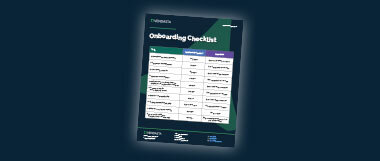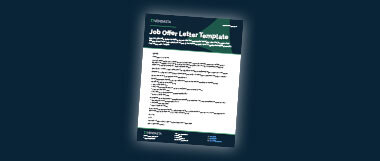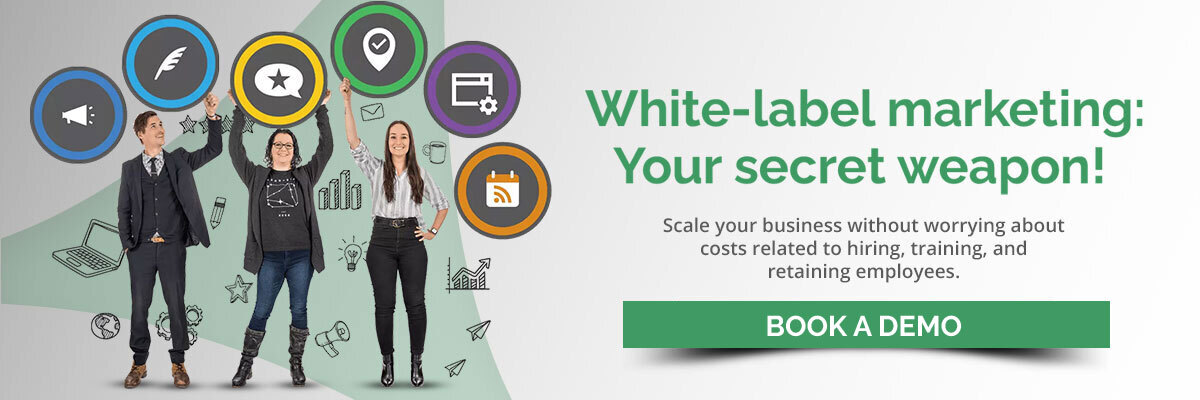The agency’s guide to hiring marketing talent
Mishires cost the US economy more than 1 trillion dollars per year. As an agency owner, you need to be mindful of your recruiting processes. Continue reading below for the steps to successfully hire and onboard the right candidates who are responsible for the success of your business.
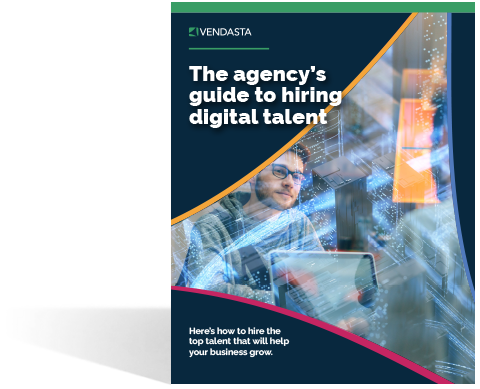
Continue reading to:
- Discover the steps you need to take to plan your next hire before you ever set eyes on a single application
- Access templates for crafting better job descriptions and offer letters
- Gain insight into the right questions to ask candidates during the hiring process
- Download our employee onboarding checklist to ensure a smooth transition for all agency new hires
PREFACE
Introduction
To say the job market has undergone a shake-up in recent years will sound like an understatement to anyone involved in recruitment for digital marketing. Hiring a marketing team isn’t an easy feat. In fact, hiring marketing talent is one of the top challenges faced by many agencies today.
The effect of the pandemic has been dramatic on how workplaces conduct business. All the while, employee expectations around salaries, remote work, and schedule flexibility have also shifted. Couple this with a general climate of economic uncertainty propelling many to seek better employment, and you have the perfect conditions for what has been dubbed the Great Resignation. This dramatic churn in the labor market saw the percentage of US employees leaving their jobs in 2021 reach 20-year highs.
Maybe you’ve experienced the effects of the Great Resignation at your agency. Perhaps you simply need to hire more digital marketing experts or hire creative talent to help you deliver your digital services to a growing list of clients. Either way, having the right hiring strategy in place can save you time and money while ensuring the new digital marketing experts you hire are the best possible fit for your needs. As you likely know well, hiring the best digital marketers is a constant dilemma in the agency world.
According to recent research, the estimated cost of a bad hire is $17,000. By getting your hiring right from the start, you can limit the likelihood of investing in someone who isn’t a good fit and avoid paying the cost of a mishire.
That’s why we created this guide: to help digital agency owners navigate the hiring process smoothly and effectively, so they can find, onboard, and retain the digital marketing experts and creative talent necessary for scalable growth. By the end of your readings, you’ll have a blueprint to define your staffing needs and effectively identify, recruit, and hire marketing talent that is best suited to meet your requirements.
Grow without
increasing overhead
SECTION ONE
When hiring marketing talent, start with a plan
By taking the time to thoroughly assess the current labor market and economic climate, your needs, your budget, the job to be done, and other variables, you can set yourself up for success on the first try. In other words, the person you hire for the job will be the best fit for the duties at hand, because you’ve taken the time to understand exactly what that need is.
When hiring marketing talent, start by thoroughly assessing:
- The current labor market
- The economic climate
- Your staffing situation and hiring needs
- Your budget
- The job to be done
If you can’t clearly articulate your needs, you run the risk of hiring and onboarding someone who doesn’t quite have the right skill set or isn’t a good fit. Alternatively, you might find yourself in a situation where a highly competent person doesn’t stick around because they didn’t get a fair impression of what the job entails during the hiring process.
A plan helps prevent many of these costly hiring mishaps.
Here’s exactly how to create yours.
Define your needs
You don’t need us to tell you that the agency environment can be very fast-paced. As your client list grows and your team gets busier, the pressing need for more digital marketing experts is felt by everyone. If your business is going to grow, you need more marketing talent in order to keep up with client projects and deadlines. You also need to be able to walk away from fulfillment yourself to make the time to pursue new clients.
It’s exactly in that busy, fast-paced environment that costly, disappointing hiring mistakes are made. In a hurry to fill the obvious need for more capacity, agencies often rush to hire creative talent or digital marketing specialists without understanding where exactly they need the most support.
Here are some questions to ask yourself and your marketing team in order to arrive at a useful description of your agency’s requirements:
- What are the tasks that existing marketing team members are struggling to complete or completing inadequately? It’s worth getting input from people engaged in different parts of your agency in order to get a full picture.
- Are any existing employees being underutilized because they’re stretching themselves too thin or working on the wrong tasks? In this case, it might make sense to promote them internally and have them help define the job of their replacement.
- Of the requirements you’ve identified so far, which are the most high-priority? You want to be able to articulate for prospective hires exactly which areas require the most focus.
- Do you need a short-term project-based contractor or a long-term addition to your marketing team? Sometimes, hiring a permanent staff member when you really needed shorter-term support can prove to be costly.
- What are your agency’s values and culture? It’s important to be realistic rather than idealistic here. The goal is to find someone who will fit into the existing culture.
The goal of this planning step is to honestly assess the gaps in your current marketing team, so that you can know exactly what you’re looking for and accurately communicate to prospects what the job will entail. Understanding your needs will help you write better online marketer job descriptions, identify well-suited marketing talent, and outline expectations more effectively than you would if you jumped right into creating a job posting.
Subscribe to our newsletter
Explore industry tips, tricks, and how-to’s in our weekly content update.
Develop metrics
Once you’ve identified your agency’s needs, it’s time to translate them into quantifiable metrics.
The more your expectations can be put in measurable terms when hiring a marketing team, the better you will be able to ensure that you and your prospective hire are on the same page about what they will accomplish in their role.
Another reason to develop metrics during the planning stage is so that you and your existing marketing team have a chance to double-check your expectations and make sure they’re realistic. If everyone who will be interacting with the new digital marketing expert on staff has a long list of poorly defined expectations, it may prove to be too much for one person to do effectively.
What’s more, a great hire may feel unappreciated and pulled in too many directions. Putting your marketing team’s expectations in measurable terms makes it easier to spot whether the expected workload is feasible, as well as make adjustments to the expectations if it isn’t.
5 Reasons to develop hiring metrics
- When hiring a marketer, get on the same page with candidates about what they should accomplish in the role
- Ensure your expectations are realistic
- Make it easier to spot when the expected workload for a new hire isn’t feasible
- Make it possible to identify when adjustments to expectations are needed
- Hiring metrics can be translated into a performance plan post-hire
Finally, measurable expectations can be translated into a performance plan with key performance indicators (KPIs). Having clear goals and performance targets to work toward is motivating for most people. Not only will you be glad to have this to refer to once your new digital marketing specialist begins, but the best digital marketers will know to ask for this kind of information during the interview. If they ask you what your idea of success looks like a few months or a year after onboarding, you want to be prepared with a clear idea of what KPIs will be.
What do measurable metrics look like? This will vary greatly depending on what kind of role you’re hiring for. For example, if your digital agency focuses on SEO for small-business clients and you’re hiring an SEO specialist, some measurable KPIs might include:
- Monthly organic traffic targets for key clients
- Number of SEO audits completed for prospective clients
- Creating quarterly reports briefing the team on updates and changes impacting SEO, such as algorithm and ranking factor changes
Establish a budget
You should have a budget in mind for the salary range you can offer. The best digital marketers can typically command top dollar, so your salary range may put some constraints on who you can hire. If you have a more limited budget, you may want to try working with a contractor for a fixed amount of time rather than hiring marketing talent permanently, for example.
Even before salary considerations, there are costs associated with hiring. The average cost of hiring an employee is about $4000. Having a budget in place for the hiring process, and for expenses apart from their salary, will ensure you’re not taken by surprise when these costs are incurred. Some of the expenses to consider when hiring a digital marketer include training resources and career development.
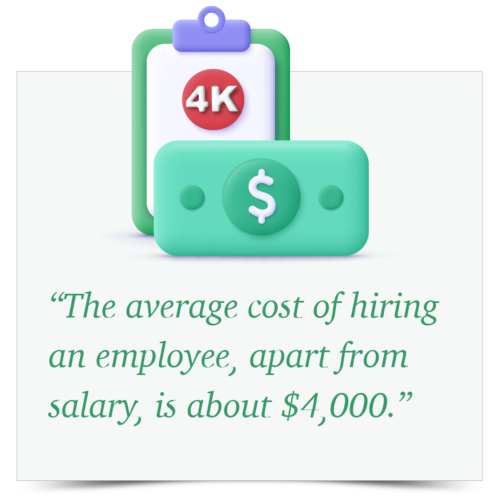
There are many job posting sites out there that offer a free tier or trial period such as Glassdoor, Indeed, and ZipRecruiter. However, you’ll get access to improved features and visibility with the paid tiers. Once you know how many sites you want to list on, go through the various tiers to figure out roughly how much it will cost to list with each of them.
You may wish to work with a firm that specializes in recruitment for digital marketing in addition to (or instead of) traditional job posting websites. This is typically more costly, but they can sift through lower-quality candidates and present you only the best digital marketers who are highly likely to meet your requirements. They might also be able to fill your position faster. If you plan to go this route, consult with a recruitment firm to determine their pricing and build it into your hiring budget.
Implement a remote, flexible or hybrid work policy
It’s important to remember the world of work has changed and, in a competitive labor market, giving prospective employees the flexibility to choose where they work from can help your agency stand out. Additionally, such a policy can help you attract the best digital marketers with skill sets that may not otherwise be available in your local area. In fact, it’s one of the top tips for hiring marketing talent.
Jack Pires, Founder and CEO of New Jersey-based SocialJack Media, says a fully remote policy has helped him attract and retain digital marketing experts.
A clear remote, flexible, or hybrid work policy should specify when and how employees can work from locations other than the office or on a flexible schedule. It should include other important considerations such as the tools and technology employees receive and how they’re required to keep information safe.
On-demand webinar
Weatherproof your agency
Combat labor shortages and discover how to adapt and endure changing market conditions. Hear from SocialJack Media CEO and Founder Jack Pires and Vendasta COO Jacqueline Cook on the importance of adapting your hiring strategy to fit the current economic climate.
Define your onboarding plan
Creating an onboarding plan may seem like something best left until after you’ve selected a candidate. However, there are benefits to both your agency and the new marketing hire to having an onboarding plan in advance of the interview stage.
Firstly, starting out at any new organization can feel like getting thrown into the deep end. Things that are second nature to existing marketing team members won’t immediately be understood by the new hire. Plan in advance exactly who in your agency will be responsible for each step of onboarding. This will ensure your new digital marketing specialist will have the best chance of getting a good handle on how things are done early on.
If you wait until after hiring a marketer to create this plan, you’re more likely to have to rush the process. You may have a harder time getting availability from other members of your team who could be instrumental in showing your new hire the ropes.
Separately, at the interviewing stage, sharing a bit about what the onboarding process will look like demonstrates that you’re a well-organized agency that is committed to the success of its marketing team.
Download the agency new hire onboarding checklist
SECTION TWO
Create the online marketer job description
Now that you have a solid understanding of your agency’s needs, your budget, the metrics you will use to measure success in the job, and your plan for onboarding your new digital marketing specialist, you’re ready to write an excellent online marketer job description that attracts quality creative talent.
One research study that included 1400 employers found that 72% of hiring managers think they’re writing clear job descriptions, while only 36% of candidates agree.
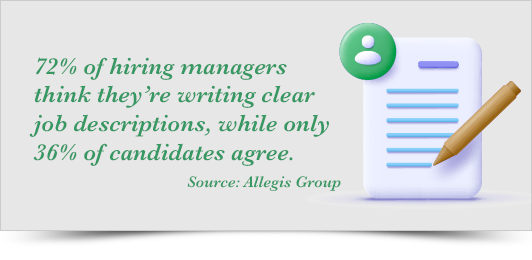
That’s a significant gap, and it points to the risk of rushing through the planning and job description process: Your ideal candidate may be among the 64% who are put off by an insufficiently clear description.
So, how can you make sure your online marketer job description is among the ones that resonate with candidates? Here are our five top tips:
- Open with a brief description of what your agency does. This should only be a line or two, but it provides context and helps candidates envision what the daily activities of your agency might be.
- Keep it honest, but remember you’re trying to entice the best digital marketers. This means instead of listing everything you want them to do for you, think about why they should choose you over your competitors. We’re not talking about things like yoga classes and free lunches, although it helps to mention those extra perks too. Talk about what kinds of skills they will develop and what interesting, engaging projects they’ll get to own by working at your marketing agency.
- Use your brand voice. The brand voice that you use in places like your marketing copy and your website should be used in your online marketer job description. This will help you convey your agency’s culture and values implicitly from the start.
- Identify the most important skills for the job. Remember that there are fantastic candidates out there who may not have every skill you’d ideally like to see for the job. Try to identify the top 3 or 4 skills that are non-negotiable, since the right candidate will likely be able to pick up less important skills on the job.
- Avoid empty jargon. Some words like “innovative” and “disruptive” don’t mean much and will make your job description sound generic and uninspired. If you catch yourself using filler jargon words, remove them or replace them with a more thoughtful word that is true to your brand.
Candidates should read your online marketer job description and have some sense of what their primary responsibilities would be, what kind of work they’ll be measured on, and what is enticing about your agency over others.
Download the agency job description template
Common mistakes in online marketer job descriptions
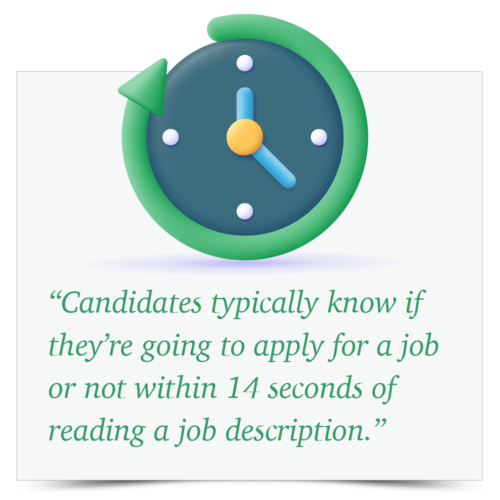
Here’s an unsettling statistic: Candidates typically know if they’re going to apply for a job or not within 14 seconds of reading a job description. Avoiding these common job description mistakes can help you avoid landing in the “no” pile with top marketing talent. Make the most of those 14 seconds by steering clear of these frequent mishaps:
- Making the description too long. Job posts in the under-300 word range perform significantly better than longer posts. Say what you need to say briefly, clearly and concisely for a boost in response rate of about 8.4%.
- Using language that isn’t in line with your culture or goals. We’ve talked about avoiding jargon, but it can also be detrimental to use language that doesn’t reflect your culture. An agency that likes to keep things very formal shouldn’t use laid-back language, since they’ll provide a misleading impression of their workplace atmosphere. Candidates looking for a casual environment will drop off anyway, so it’s a waste of everyone’s time to mislead them.
- Writing a laundry list of tasks. While you want to provide a sense of what the candidate would be working on from day to day, a long uninspiring to-do list is unlikely to appeal to the best digital marketers. It may even scare them off. Instead, focus on the bigger picture, such as longer-term projects they will be working on or skills they will develop.
Choosing the right salary range
When hiring a marketing team, whether or not you choose to include the salary range in your job description is up to you. There are benefits to including it, but it all depends on your agency’s policy.
If you’re comfortable having your agency’s salaries out there, including a range in your online marketer job descriptions can help eliminate underqualified candidates who may not be comfortable applying for jobs above a given range. Candidates with salary expectations above your budget will also be unlikely to enter the competition. This can save you the time of going through tons of applications for candidates who ultimately wouldn’t have been a good fit.
Even if you don’t include a salary range in your public postings, you should have a realistic range in mind so that you can productively discuss it with candidates. The appropriate range will depend primarily on the economy and going salaries for the role, experience required, workplace location, perks like paid time off, and the size of your agency.
Cheapest is not necessarily the best
As the saying goes: buy cheap, buy twice.
If your salary range is too low or you intentionally seek an inexperienced or junior digital marketer for a role that requires experience, you’re likely to get lower-quality results. You’ll also pay for it in other ways, such as by investing a significant amount of time in training them or needing to replace them if they aren’t delivering.
Chris Montgomery, CEO of California-based Social Ordeals, points out that local businesses are often jaded by the number of digital products and salespeople approaching them. That’s why he pays up for sales talent to get the job done.
Explore the case study: Entrepreneur earns $4.7M in revenue with Vendasta
Other factors that attract top marketing talent and creative talent
Salary is certainly an important factor in attracting top marketing talent. In a labor climate that currently favors employees, many of the best digital marketers are in a position to be very selective about where they work. However, salary isn’t the only selling point you can offer when hiring a marketing team.
Consider Pew Research’s findings about why workers resigned en masse in 2021: 37% cite low pay as a major reason, and only slightly fewer—35%—cite feeling disrespected as a major reason. Another top reason cited by 33% of respondents was the lack of opportunity for advancement. Clearly, the appeal of a job goes beyond the salary.
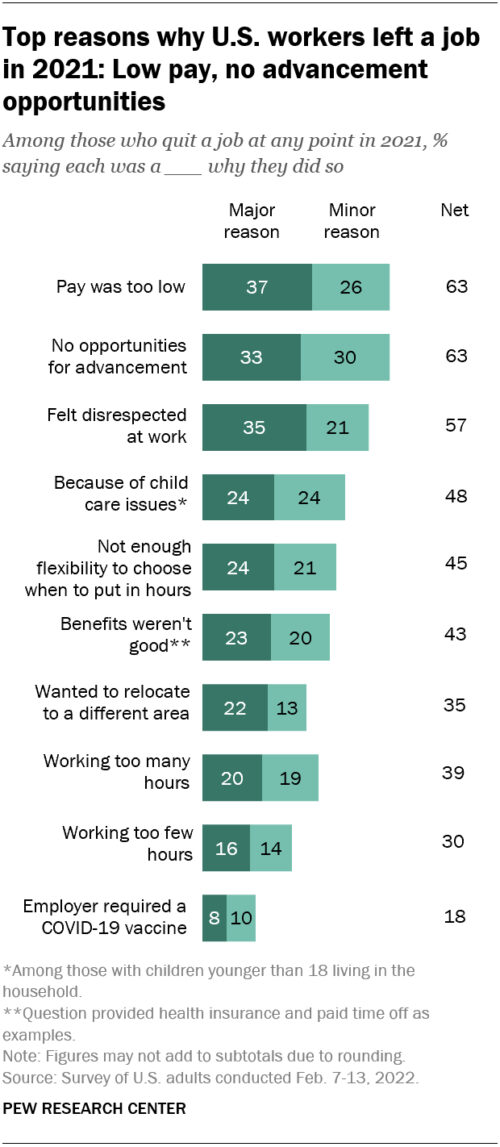
Source: Pew Research
We spend much of our waking lives working, and even a fantastic salary can’t make up for bad working conditions and poor work-life balance. The non-monetary factors that attract marketing talent aren’t things that can just be talked about in an online marketer job description; they tend to be cultivated over time.
One example is the reputation your agency has in your industry. It takes some time to build a reputation as a fantastic workplace, but by caring for the needs of your employees, you can develop a positive reputation that precedes you and attracts top marketing talent.
Most people also want to get a sense of purpose from the work that they do. They want to feel they’re an important and appreciated part of the markeitng team and that they have a role to play in the agency’s success. The more you foster these values with your existing staff, the likelier it will be that top creative talent will want to work for you.
Other benefits to promote to your ideal candidates include:
- Respect for their time off
- Opportunities for professional development and advancement
- Medical and health benefits
These are also likely to be considered by candidates making a decision about working for you.
SECTION THREE
Getting your job in front of top marketing talent
With your perfectly crafted online marketer job description ready to go, it’s time to start getting it out there. There are many job listing websites out there, and you can list on as few or as many as you want. You might find after going through the process several times that you get a sense of which listing site tends to have the best marketing candidates for your niche. With some experience, you may end up posting on just one or two sites that proved to be fruitful in the past.
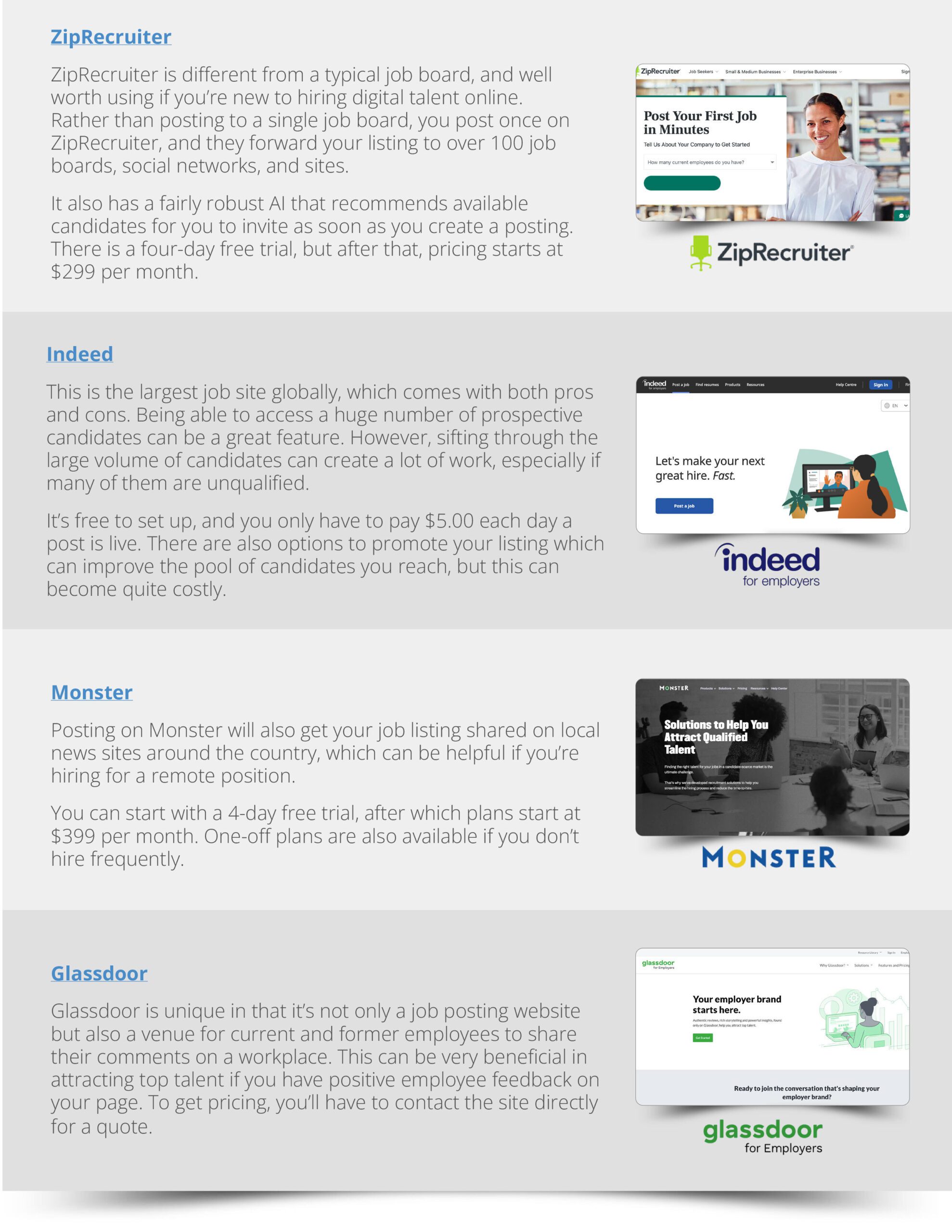
Other ways to find talent
Job boards can be an effective way to find and hire marketing and creative talent, but they’re not the only way to get the word out about your job opening. Here are some more venues to consider:
-
- Your website careers page. If you don’t have one yet, it’s well worth creating. You never know who might be casually browsing your site and see your opening, who would otherwise have missed it. Those who discover your job posting this way will already likely be familiar with and have some interest in your agency.
- Referrals in your network. Consider sending your posting to trusted colleagues in your industry. They may know of interested candidates, and this provides an extra vetting step since they’re coming from a trusted source. You can also incentivize your existing marketing team to make referrals by offering a bonus if their referred candidate is successful.
- Social media groups. If you’re a member of groups in your niche that allow job postings, don’t miss out on the free opportunity. LinkedIn is always a popular social channel for job ads.
- Direct contacts. The equivalent of cold-calling for recruitment for digital marketing, directly contacting people you think might be great for the job never hurts. Firstly, it’s always flattering to be sought out. This already sets up your agency to make a positive first impression on your prospective candidate. Secondly, you never know who might be looking for a job. If the opportunity is compelling enough, someone who wasn’t actively looking for a new job may still want to apply. You might want to directly contact digital marketing experts and specialists with the right skills that you find on LinkedIn, for example. You may also reach out to your current or previous contractors to ask if they’d be interested in a full-time role. Alternatively, you could even consider reaching out to the best digital marketers at other agencies.
SECTION FOUR
Choosing the right candidate for your marketing team
Hopefully once your online marketer job descriptions go live, you’ll see plenty of applications coming in. You’ll need a process to effectively whittle down this big pile down to the most qualified, best-fit candidate.
Start by screening out the no’s
Resumes are imperfect: They can only tell you so much, and candidates that look great on paper might fall flat in person. Some that don’t particularly shine on their CVs might feel like the perfect addition when you meet them in person.
However, when you have a long list of candidates to sift through, you don’t have time to do an in-depth review of each candidate. Trust your gut and quickly file applications into three piles: yes, no, and maybe. Look for candidates that meet some of your most important requirements, but don’t look for perfection.
Set up a short call with the remaining candidates
Chances are, there will be enough candidates that you feel confident about in your yes pile that you may not even need to consider the maybes. If you only ended up with a few in your yes pile, you can go through the maybes again and add some of those to the list of candidates you set up a call with.
Whether you opt for Zoom or an old-school phone call, the point of this step is to get a better sense of how each candidate presents themselves and how competently they answer some opening questions.
You might ask some of the following questions:
- Can you tell me a bit more about your experience?
- What attracted you to this job posting?
- What makes a job motivating and enjoyable for you?
- What are some of your career development goals or areas you’d like to improve in?
From these phone calls, you should be able to narrow your list down to the candidates you want to interview in person.
Conduct in-depth interviews with the top marketing talent
In-depth interviews might be conducted in person or via videoconferencing. These days, most marketing roles, like project management, copywriting, strategy, web design, and development, can be fully remote, so you might not necessarily be meeting anyone in person.
When hiring a marketing team, you’ll probably want to limit the number of candidates at this stage to somewhere around 5 or 10. Advance much more than this and you might find that it takes way too long to schedule, conduct, and review the interviews.
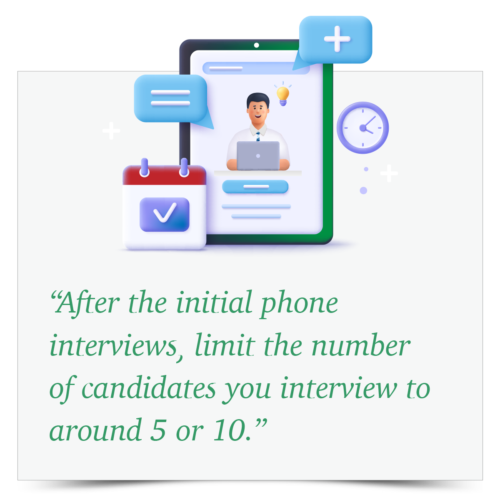
For these initial in-depth interviews, consider asking each candidate the same list of questions. This keeps things fair and ensures you cover the most important questions on your list with each candidate. When hiring a marketing team member, keep a metrics scorecard with you at each interview and fill it out for each candidate in real-time or directly after the interview.
You should also discuss salary expectations to make sure you’re both in the same range.
Once you meet the candidates at this stage and go over some questions, you should have a pretty good idea of which few digital marketing experts you’re most excited about it. The next interview stage is where you can leave the script behind and have a more wide-ranging conversation to really determine if they’ll be a strong addition to your marketing team.
Conduct subsequent interviews involving more of your marketing team
Since this is a more limited pool, aim to spend at least an hour with each candidate. This gives them enough time to overcome initial nerves and gives you both a chance to get into a more natural, conversational rhythm.
This is when you’ll be able to go into more detail about what the position entails, what the day-to-day at your agency is like, and what kinds of things you’d like them to work on first if they are successful.
By meeting more of your existing marketing team, the candidate also gets the opportunity to get an authentic feel for the company culture and to get answers to their questions from multiple sources.
Conduct a paid mini project
Depending on the kind of marketing or creative talent you’re hiring, you may want to assign them a small paid project to see how they work and how they interpret a brief. Remember that at this stage of hiring a marketing team member, there is still plenty that they won’t know about how you do things at your agency. For this reason, look for general skill and competency rather than perfection.
Ideas for mini projects when hiring a marketing team
- Writing or editing a blog post (for writers, editors, content strategists, content marketing specialists)
- Analyzing the SEO elements on your website’s homepage (for SEO managers, SEO specialists, content marketing specialists, content strategists)
- Designing a digital ad or logo (for web designers)
- Providing a short list of suggested promotion ideas for a client’s upcoming event (for demand generation managers, communications roles, public relations roles)
Factors to consider when making your final hiring decision
Throughout the interview process we’ve outlined, you’ll discover which candidates seem to have the right skill set, attitude, experience, and general cultural fit for your agency.
Apart from their answers to your specific questions, keep an eye out for additional cues about whether they’ll be a good addition to your marketing team:
- Are they timely in their communications and do they arrive at interviews on time? At this stage, you’re both trying to impress each other. They should be able to show that they respect your agency by being timely.
- Do they ask good questions? The best digital marketers out there will be engaged in the process and ask plenty of questions. They will likely have options in terms of where to work, and they will know what they want out of a workplace. If they’re engaged in the interview questions and asking plenty of good questions about what it’s like to work for you, take that as a positive sign.
- Do they blame current or former colleagues and employers? They may have had some bad experiences in the past, but a true professional takes responsibility for their situation and either tries to make it better or moves on. If they have nothing but disparaging things to say about previous workplaces, they may soon be blaming challenges and failures on their colleagues at your agency.
- Do they have learning ambitions? Look to hire a marketer who is open to learning and improving, rather than someone who is sure they already know all there is to know in their field.
While you don’t want to rush the decision-making process, be mindful of the fact that the best digital marketers may be getting offers from other employers, so if you’re really enthusiastic about someone, you may have to move quickly with an offer.
Closing the offer
If all has gone well up to this point, you’ll have settled on an amazing candidate you’re enthusiastic about. The next step is to inform them that you’d like to offer them the position. Especially for agencies that are smaller and don’t have a big sprawling HR department, a personal informal call can be a nice touch. Then, follow the call with a formal letter.
Your offer should lay out a start date, a brief description of the job and its responsibilities summarizing what you’ve already discussed with them, the terms of their employment, their compensation, and any other benefits.
If they accept, you’ll be ready to dive into the onboarding plan that you already set out before posting the job.
Download the job offer letter template
SECTION FIVE
Refine your hiring process
By the time you’ve onboarded your new hire, there’s no doubt that you’ll have learned a lot about the hiring process. While training and keeping up with all your other tasks, it can be tempting to leave the hiring process behind you until the next time you need to hire creative talent. However, now is the perfect time to go over how it all went.
The process of hiring marketing talent is fresh in your mind, so take some time to go over what went in your recruitment for digital marketing talent, what didn’t, and what you think you can do better the next time you’re hiring a marketer. Make sure you document this somewhere where it’s accessible by your whole marketing team so that people can avoid making the same mistakes next time they’re involved in the hiring process.
And like any other skill, you will improve as an interviewer the more experience you have. You’ll know what kinds of responses to look for and what constitutes a red flag. Taking the time to document these observations will make your hiring process go as smoothly as possible next time—because as you scale your agency, there will always be a “next time,” and it might come up quickly.
SECTION SIX
Consider an alternative to hiring a marketing team: Leveraging a white-label provider to fulfill your digital services
You need top marketing talent and creative talent to deliver quality work for your clients and grow your business. But hiring, as we’ve discussed, can be time-consuming, risky, and expensive. Hiring costs can eat into the increased profits from growth, making it difficult to determine the right time to hire. It is always difficult to balance overhead and profits in an agency, as we are sure you know all too well.
Plus, sometimes, there are good reasons not to hire a PPC expert, a new writer, or a web designer. Sometimes, agencies struggle to hire marketing talent.
If you or your sales team is onboarding new clients at a fast rate, but your in-house digital team doesn’t have the capacity to take them all on, you may not have the time needed to hire top marketing talent. Consider an alternative, then: White-label digital service providers like Vendasta offer an alternative to hiring that makes it easy to scale your agency sustainably without increasing overhead.
Rather than going through the long and costly hiring process, which can potentially result in a mishire, white-label digital services are delivered by digital marketing experts working under your brand whenever you need them. That means you can count on your white-label marketing team to provide consistent, reliable top-notch digital services.
Jack Pires, Founder and CEO of SocialJack Media, says the use of white-labeled services in conjunction with employing a core internal team of full-time staff has powerful benefits for agency owners.
“Firstly, it has helped us to set ourselves apart and be that jack-of-all-trades agency for local businesses. When a client has a specific solution they need, if our internal team can’t provide it, we’ll turn to a vetted white-label service provider to fulfill those requests. That allows us to scale and bring on additional revenue streams,” he says.
“Secondly, financially this model of outsourcing allows us to have sustainable growth as it helps us control our business costs.”
Rather than committing to a salary, you only pay for white-label digital marketing services when your clients use them. It is easy to scale up and scale down as your needs change.
Further, because you’re technically reselling marketing services, this means you can set your own margins and you don’t have to incur any costs before you start making a profit.
White-label digital services you can start offering through your agency right now from Vendasta include:
|
White-label digital marketing: From listing and reputation management to web design and digital advertising, you can offer your clients a full suite of digital marketing services suitable for any local business. |
 |
|
White-label PPC: Pay-per-click advertising has become a must for both local and ecommerce businesses, and offering this high-value service can help you deliver tangible results to your client’s bottom lines quickly. |
 |
|
White-label social media marketing: Social media marketing is notoriously time-consuming, but with white-label solutions, you can drive visibility and engagement online through an expert team working under your brand. |
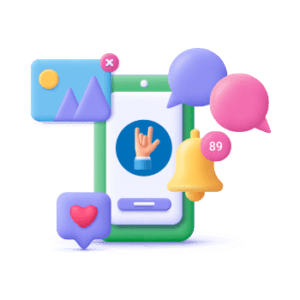 |
|
White-label ecommerce: Help your clients build their ecommerce presence with an online store that converts. |
 |
| Website copywriting: Content is essential for SEO success, and you can help your clients climb the search engine results pages (SERPs) and delight their audience with white-label, expertly written copy. |  |
Conclusion
Grow your agency with the right marketing talent
It’s an exciting time to be in the digital agency space: More business is taking place online than ever before, creating plenty of opportunities for agencies offering digital marketing services.
However, taking advantage of these opportunities requires you to have the right marketing talent on your team to help make your business goals a reality. In the aftermath of the Great Resignation, top marketing talent is highly sought after. Following our guide to hiring a digital marketing team will help you expertly navigate the hiring process. This will ensure that you get the best digital marketers on your team who can help your business grow to new heights.
Alternatively, you might consider leveraging white-label marketing services instead of hiring a marketing team in order to grow, increase your client base, and efficiently fulfill client work without increasing your overhead. With Vendasta’s white-label Marketing Services, you can skip the hiring process and grow sustainably—without adding employee overhead costs.
Frequently asked questions


How much does it cost to hire a marketer?
A marketer’s annual salary in the US is $78,931 in United States. On top of the marketer’s salary, you’ll need to add on the costs of hiring, which is around $4,000 USD.
How to hire a marketer?
You can hire a marketer by working with a recruitment agency dedicated to digital marketing, posting on job boards and social media sites, adding a job posting to your careers page, requesting referrals from your network, or directly contacting marketers you know, such as marketers at other companies or your contractors, to see if they’d be interested in the role.



